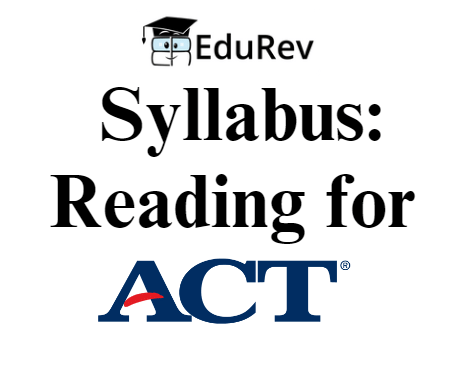Syllabus: Reading for ACT | Reading for ACT PDF Download
| Table of contents |

|
| Overview |

|
| Detailed Syllabus |

|
| Pattern and Weightage |

|
| Tips for Reading Section |

|
The ACT consists of 4 tests (English, Math, Reading, and Science) and an optional Writing test (Essay). The duration of the ACT is 3 hours 35 minutes with the essay and 2 hours 55 minutes without the essay. There are two breaks in the test.
Overview
The reading section of the ACT is designed to evaluate your capacity for thorough examination of written passages, logical reasoning based on textual evidence, and effective integration of information from diverse sources. This section encompasses a range of text types, such as prose fiction, humanities, social sciences, and natural sciences, mirroring the breadth of materials encountered in college-level coursework. Through a series of multiple-choice questions, you will demonstrate your ability to identify main ideas, locate supporting details, discern relationships between ideas, make inferences, analyze the author's purpose and tone, and evaluate arguments. Furthermore, you will be required to synthesize information from different parts of the passage and across multiple passages to provide comprehensive responses.
Detailed Syllabus
- The reading section tests the candidate's logical reasoning and interpretation skills, along with English language proficiency.
- This section contains four passages from four different genres -
- Social Studies
- Prose Fiction
- Natural Science
- Humanities
with each passage having 10 questions.
- Reading section questions focus on essential skills for understanding written materials across different subjects.
- Skills tested include identifying main ideas, locating significant details, understanding sequences of events, making comparisons, comprehending cause-effect relationships, interpreting context-dependent words, drawing generalizations, analyzing the author's voice and methods, assessing claims and evidence in arguments, and integrating information from multiple texts.
- The reading section comprises various parts, some with long prose passages and others with shorter prose passages.
- Passages represent typical texts encountered in first-year college courses.
- Each passage is introduced by a heading identifying the author and source, sometimes including background information.
- Multiple-choice questions follow each passage, testing comprehension and analytical skills related to the text.
- Questions do not require memorization of facts outside the passage, application of formal logic rules, or isolated vocabulary knowledge.
- In sections with two shorter passages, some questions may involve both passages.
Pattern and Weightage
1. Main Ideas & Details (52–60%)
- This section assesses your ability to:
- Understand central ideas and themes in texts.
- Summarize information accurately.
- Recognize relationships and draw logical conclusions, including sequential, comparative, and cause-effect relationships.
2. Writing Style & Structure (25–30%)
These questions involve:
- Determining word and phrase meanings.
- Analyzing an author's word choices.
- Understanding text structure.
- Identifying the author's purpose and perspective.
- Analyzing characters' viewpoints.
- Interpreting authorial decisions.
- Differentiating between various perspectives and sources of information.
3. Integration of Knowledge & Ideas (13–23%)
This category requires you to:
- Understand authors' claims.
- Differentiate between facts and opinions.
- Use evidence to connect related texts.
- Analyze how authors construct arguments and evaluate reasoning and evidence from different sources.
4. Visual and Quantitative Information
- In some passages, there may be accompanying visuals like graphs, figures, or tables. Questions may ask you to interpret information from these visuals or integrate them with the passage to find the best answer.
Tips for Reading Section
Reading Passages Carefully
- Carefully read each passage before answering questions.
- Pay attention to how ideas are connected and important points in the passages.
Using Passages for Answers
- Some answers can be found directly in the passages.
- Other questions require understanding implicit meanings, drawing conclusions, and making comparisons or generalizations.
- Always consider the text before answering any question.
|
19 videos|91 docs|3 tests
|
FAQs on Syllabus: Reading for ACT - Reading for ACT
| 1. What is the ACT Reading section? |  |
| 2. How many passages are included in the ACT Reading section? |  |
| 3. What types of passages can be expected in the ACT Reading section? |  |
| 4. How much time is allotted for the ACT Reading section? |  |
| 5. What strategies can be used to improve performance on the ACT Reading section? |  |















